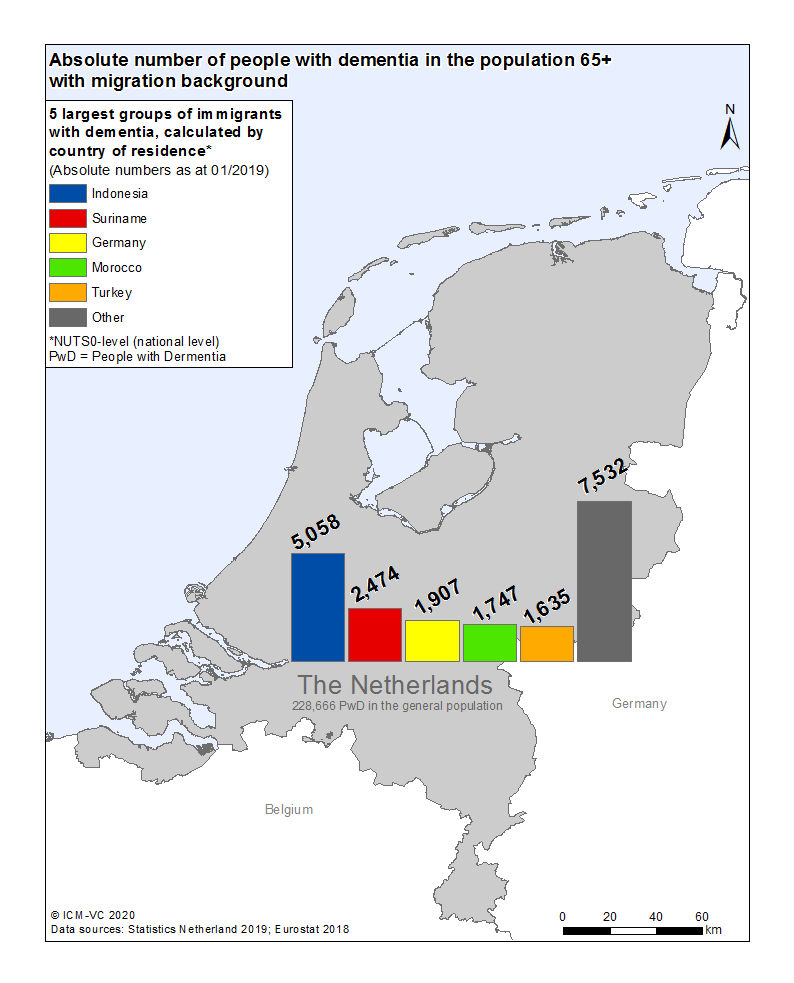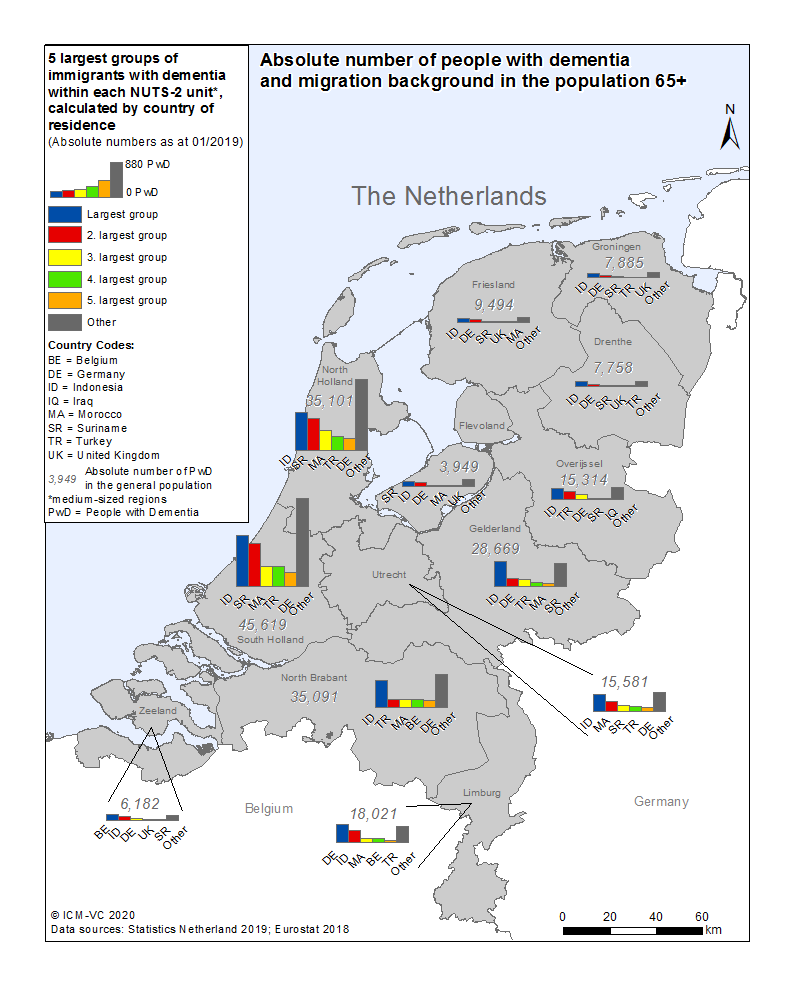EU-Atlas: Dementia & Migration
| Largest group | 2. largest group | 3. largest group | 4. largest group | 5. largest group | |
| Absolute numbers | |||||
| PwMD per 100,000 inhabitants 65+ |
| Absolute numbers | PwMD per 100,000 inhabitants 65+ | |
| Largest group | ||
| 2. largest group | ||
| 3. largest group | ||
| 4. largest group | ||
| 5. largest group |
| Prevalence per 100,000 inhabitants 65+*, calculated by country of residence | |||
|---|---|---|---|
| high > PwMD |
minor > - PwMD |
||
| increased > - PwMD |
low ≤ PwMD | ||
| medium > - PwMD |
|||
| PwMD = People with a Migration background with Dementia *Bulgarien, Litauen, Malta, Polen in der Bevölkerung 60+ |
|||
| Absolute number of PwMD 65+ | |
| PwMD per 100,000 inhabitants 65+ |
Netherlands
Dutch migration history is characterised by large immigration and emigration flows. Immigrations were mainly a consequence of World War II and people immigrating from former colonies (e.g. Indonesia, Suriname) and guest worker countries (e.g. Turkey, Morocco)1,2,3. The migrant population (born abroad) almost doubled between 1990 and 2019 (1.2 to 2.3 million). At the same time, the proportion of migrants in the total population has also increased significantly (7.9 to 13.4%)4.
There are 295,000 people with a migration background aged 65 or older. Of those, approx. 20,400 are estimated to exhibit some form of dementia. Calculations show the most affected migrant groups presumably originate from Indonesia (approx. 5,100), Suriname (approx. 2,500), Germany (approx. 1,900), Morocco (approx. 1,800), and Turkey (approx. 1,600).
For the Netherlands, four national dementia plans were identified, but only two address migration. The ‘Care Standard Dementia’ (2013) [5] highlights that dementia is increasingly common among people of non-Dutch origin and that they have special needs in dementia diagnosis and care. The 'National Dementia Strategy 2021 – 2030’ (2020)6 emphasizes that future dementia care, must focus on cultural diversity among people in need of care. Two guidelines on dementia are available but migration is not mentioned7,8.
A hybrid healthcare strategy is implemented in outpatient and inpatient care for persons with migration backgrounds and dementia. Services and information are therefore trying to include the migrants needs. For instance, memory clinics use the cross-cultural dementia screening tool RUDAS and offer day-care programs with interpreters trained in migration and dementia. However, there are significant differences in the relevance of dementia and migration between highly and less populated cities. For example, in Amsterdam, Rotterdam or The Hague, where many migrants live, the issue is of great prominence. While in smaller provinces like Groningen or Drenthe, it does not seem to be. Consequently, such services are not available in all regions.
In the education of healthcare professionals in universities and medical faculties, a special focus is set on the topic of culturally sensitive care. There seem to be no official training opportunities for doctors or caregivers in intercultural care. However, one hospital in Amsterdam, offers courses or lectures in which health professionals or students from other regions also participate.
Families, religious communities, migrant organizations and care providers are important in supporting caregivers of people with dementia with migrant backgrounds. Family caregivers of PwM with dementia often lack information about formal services and have a very high need for specialised services providing support and information. Especially for older migrants, different paths of access to information and support are needed. There is also a high need for awareness-raising and education about dementia.
References
- Zorlu A, Hartog J: Migration and immigrants: The case of the Netherlands. 2001.
- Ersanilli E: Focus Migration: Country Profile Netherlands. In. Edited by Berlinghoff M, Hanewinkel V, Oltmer J: Institute for Migration Research and Intercultural Studies, Federal Agency for Civic Education; 2014.
- Van Meeteren M, Van de Pol S, Dekker R, Engbersen G, Snel E: Destination Netherlands: History of Immigration and Immigration Policy in the Netherlands. In: Immigrants: Acculturation, Socioeconomic Challenges and Cultural Psychology. edn. Edited by Ho J. Los Angeles; 2013.
- International Organization for Migration: International migrant stock as a percentage of the total population at mid-year 2019: Netherlands; 2019.
- Nederland Alzheimer, Vilans: Zorgstandaard Dementie: Steun en zorg. In.: Alzheimer Nederland, Vilans; 2013.
- Ministry of Health Welfare and Sport: National Dementia Strategy 2021-2030. In. The Hague; 2020.
- Ministry of Health Welfare and Sport, Zorgverzekeraars Nederland, Alzheimer Nederland, ActiZ: Guideline for Integrated Dementia Care. In.: Ministry of Health, Welfare and Sport, Zorgverzekeraars Nederland, Alzheimer Nederland, ActiZ; 2009.
- Nederlandse Vereniging voor Klinische Geriatrie: Dementie. In.: Federatie Medisch Specialisten; 2012.



![[Translate to Englisch:] Logo RBS [Translate to Englisch:] Logo RBS](/fileadmin/_processed_/9/7/csm_RBS_Logo_RGB_0e245a98a4.jpeg)